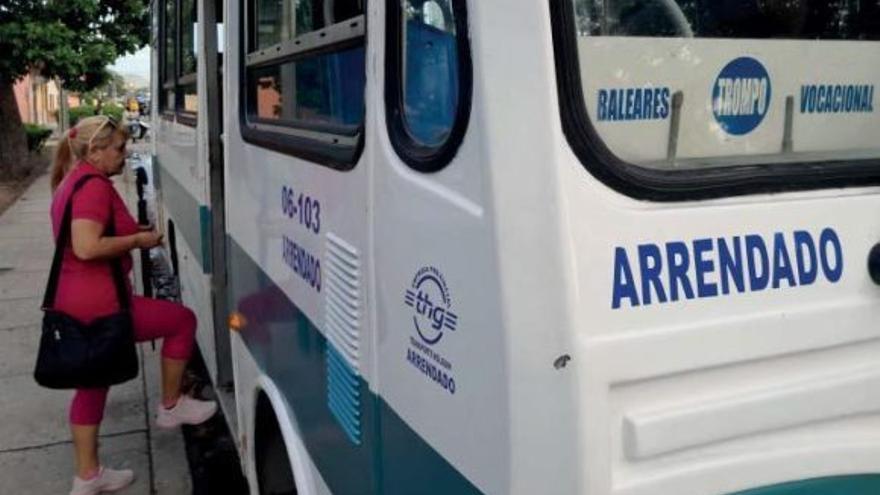
![]() 14ymedio, Havana, August 1, 2023 — The 124 state buses leased by individuals in Holguín have managed to transport five million passengers in two years. However, the drivers, who have had to repair and condition the vehicles with their own money, lament the rigidity of the authorities, who do not allow them to make trips on their own once they have completed the required daily work plan.
14ymedio, Havana, August 1, 2023 — The 124 state buses leased by individuals in Holguín have managed to transport five million passengers in two years. However, the drivers, who have had to repair and condition the vehicles with their own money, lament the rigidity of the authorities, who do not allow them to make trips on their own once they have completed the required daily work plan.
After Resolution 270 of the Ministry of Transportation, which allows state entities to lease disused vehicles to individuals and companies that wish to use them for a social purpose, went into effect in 2021, the Holguín authorities decided that, of the 591 vehicles that the province had, only 179 met the requirements to circulate under this management model, according to what the province’s Transportation company told Cubadebate.
Of these, they finally ended up leasing just over 120 buses, most of them in need of minimal repairs, such as changing tires or batteries, which cannot be found in the state market, according to the company itself.
The cost of these arrangements is borne by the drivers, who also pay out of pocket for the salary of the helpers they need, the taxes required and the fuel used by the vehicle, which the State sells – in rationed quantities – at 13.99 pesos per liter.
In return, the authorities require drivers to pay the transport company between 12,000 and 15,000 pesos per month, since they estimate that each urban route bus can collect between 22,000 and 30,000 pesos. In the case of the “semi-bus” – a truck reconditioned for transport generally in rural areas – between 5,000 and 9,000 pesos must be paid, for an estimated profit of up to 14,000 pesos.
Obtaining sufficient capital to cover their expenses and recover the large investment they made to put the vehicle into operation requires, in many cases, that drivers operate out-of-contract routes, once the company’s plan has been fulfilled. However, the authorities, wary of the additional profits, have required individuals to apply for special permits whenever they wish to carry out other work.
Faced with this position, drivers have been dissatisfied and request more autonomy.
Roger Ramírez, one of the drivers interviewed by Cubadebate, appears as the owner of a Diana bus that runs the route between Mayarí and Holguín for 50 pesos a ticket. According to his account, Ramírez operates urban tours of the main city until it is time to make the return route. “All of this benefits the people. And, of course, me.” However, he does not understand the need for so many obstacles when, without his investment, the vehicle would be idle in a state garage.
The company, for its part, has argued that the lack of order has led on several occasions to breaching the terms of the contracts. And, although they understand that the lack of fuel and the obstacles have hindered the collection of the initial budget of the drivers in the expected time, they estimate that “the most important thing is compliance with the social project under which the contracts were made.”
According to the authorities, among the infractions are the absence of the drivers on days when the route must leave the route, the deviation from the route plan to carry out other “runs” and the violation of the established price of the ticket, which they consider a serious offense.
The company believes that the problems lie in the fact that many of the drivers entered the business without being aware that they are now “public servants” and thought that they would “do whatever they want.” Some of the drivers, they say, behave rudely or dress in “shorts and t-shirt,” ignoring the dress rules and the respect towards the passenger that their new role demands.
For this reason, the entity has had to cancel the contracts of two individuals who accumulated “several indiscipline, including deviating from an agreed route and taking a trip to the beach” or being absent without prior notice knowing that the vehicles have a global positioning system (GPS).
Despite the difficulties, the authorities admit that the leasing of disabled state vehicles has been a positive and has eased the transport crisis. Before the resolution was approved, there were days when “only nine or ten cars operated,” Wilmer García, director of the institution, told Cubadebate. The fact that more than 120 now operate represents a notable improvement for the 200,000 Holguin residents waiting at the stops in the province, according to the official.
____________
COLLABORATE WITH OUR WORK: The 14ymedio team is committed to practicing serious journalism that reflects Cuba’s reality in all its depth. Thank you for joining us on this long journey. We invite you to continue supporting us by becoming a member of 14ymedio now. Together we can continue transforming journalism in Cuba.
